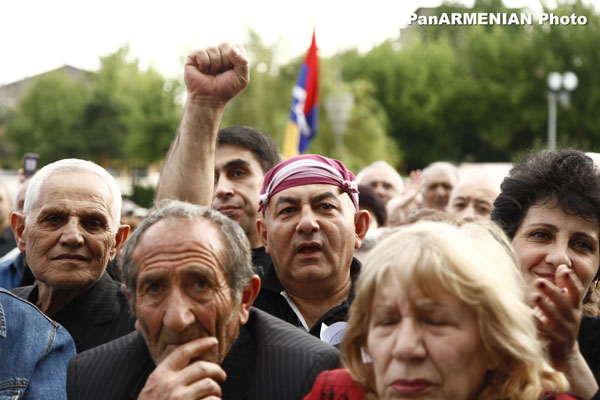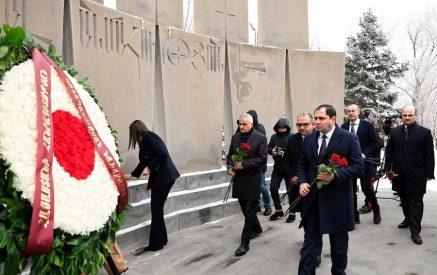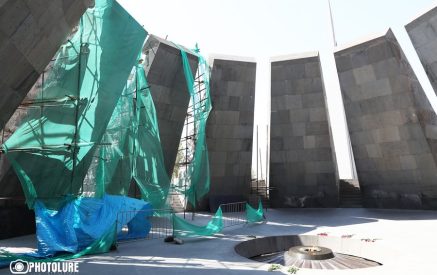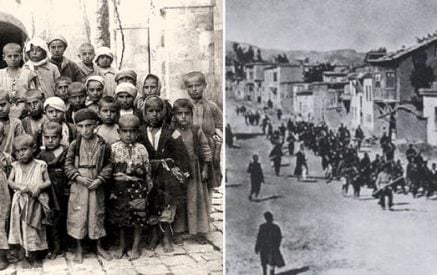On April 24, events are organized in various cities around the world, including Istanbul, Ankara, and Izmir dedicated to the 98th anniversary of the Armenian Genocide, and in some capitals, protests are organized against the Turkish diplomatic representations. As always, this year our entire nation wonders whether US President Barak Obama will pronounce the word “genocide” in his annual message commemorating the Armenian Genocide of 1915 or not. However, Obama has preferred several times before to use the phrase “Meds Yeghern” (Armenian: “Great Slaughter”), which to us, Armenians is an assertion of the fact of genocide, i.e. he didn’t doubt the fact of Great Slaughter. Given the national interests of his country, the US President doesn’t pronounce the word “genocide” and probably, no president of the US will pronounce that word, unless Turkey acknowledges the fact of
genocide. Some future government of Turkey will do that some beautiful day. It is a matter of time, and although slowly, social sentiment in Turkey gradually changes. For example, a Turkish youth made the Armenian flag his profile picture yesterday and wrote a status update that he would attend the event dedicated to “Meds Yeghern” in Taksim Square, Istanbul, today. An attempt was made in 2009 to normalize the Armenia-Turkey relations and establish diplomatic relations between the countries; in November, protocols were signed, but a few months later, Armenia suspended ratification of those protocols. It is probably no secret to any country interested in normalizing the relations that Turkey blocked this process. Even Armenian Revolutionary Federation (ARF) figures assert today that Turkey “is not like before; it has become flexible.” Kiro Manoyan, the director of the ARF Bureau Hay Dat and Political Issues Office stated yesterday: “Actually, if one talks about recognition of the Genocide by the international community, one can consider the stage of recognition passed. That is why the approach of the ARF is that now we have to raise the issue of our rights and compensation for the Genocide.” He added that both recognition of the Genocide by the international community and Armenia’s making demands of Turkey were important for Armenia. It is about territories, national property, as well as personal compensation. The Republic of Armenia and the Diaspora should certainly engage in certain work in the run-up to the 100th anniversary of the Armenian Genocide. However, the question what we have achieved in the run-up to the 100th anniversary of the Genocide is not less important. We make demands of the international community, expect utterance of the word “genocide,” but we cannot confidently assert regarding our state’s citizen that the citizen of the Republic of Armenia is well provided for in his fatherland. The task of politicians, statesmen, political scientists, and historians is to discuss how advantageous making territorial demands and demanding national property of Turkey, which hasn’t recognized the Armenian Genocide yet, can be for our country and whether it can have any impact on at least weak possibility of normalizing the Armenia-Turkey relations. However, there is a more urgent demand to be made of Turkey, in which direction the government of the Republic of Armenia seems not to take steps. Turkey blockaded Armenia – and it is a manifestation of hostile attitude – because of the Nagorno-Karabakh conflict, showing its support for Azerbaijan by that step. We obviously fail to make demands of the international community regarding this issue at the state level. Whereas this is a fact that Turkey cannot deny. What the government of the Republic of Armenia does, in order that Armenia is perceived as a more powerful country by developed countries in the international arena is more important than burning the Turkish flag in various countries around the world. And it can be done only by taking specific steps. The Turkish government made a statement at the level of Foreign Minister Ahmet Davutoğlu the other day that Turkey’s real goal is to become not a regional power, but a superpower. In this context, it is worth asking a question what achievements we, as a state, have reached and what success we have achieved in terms of increasing the importance and influence of Armenia at least in our region in the past 20 years of independence of the Republic of Armenia and in the run-up to the 100th anniversary of the Genocide….
Emma GABRIELYAN



























































